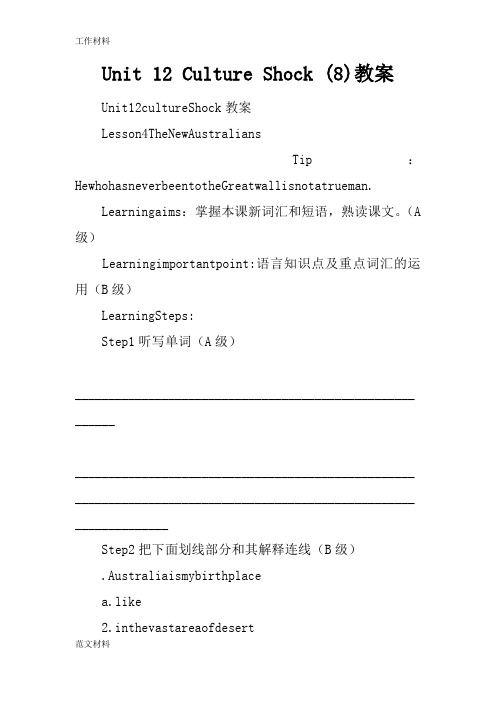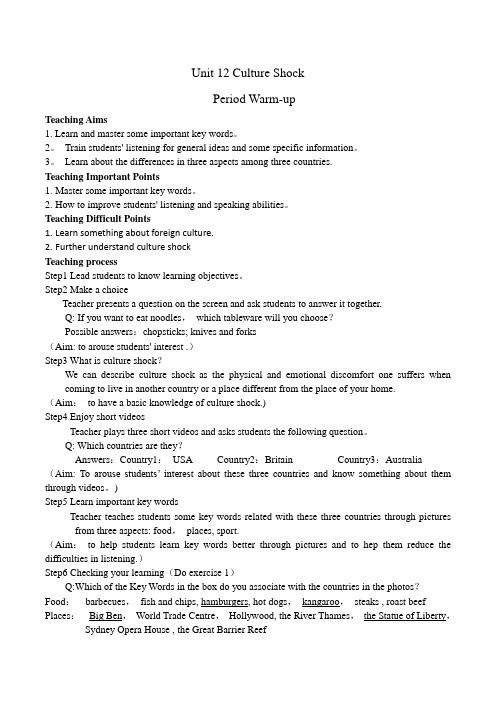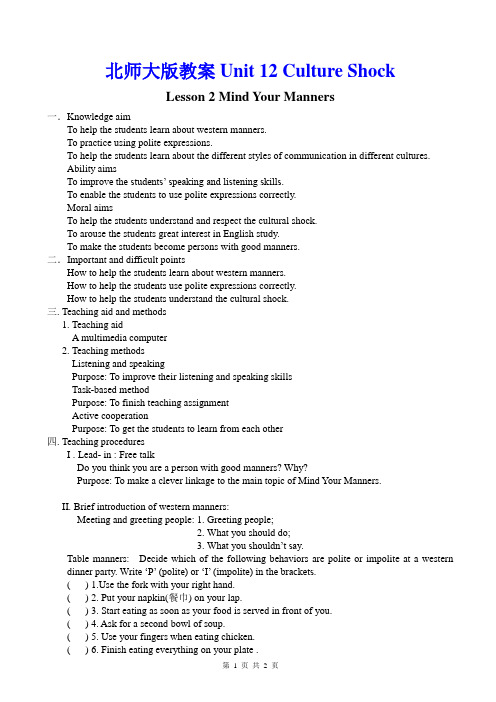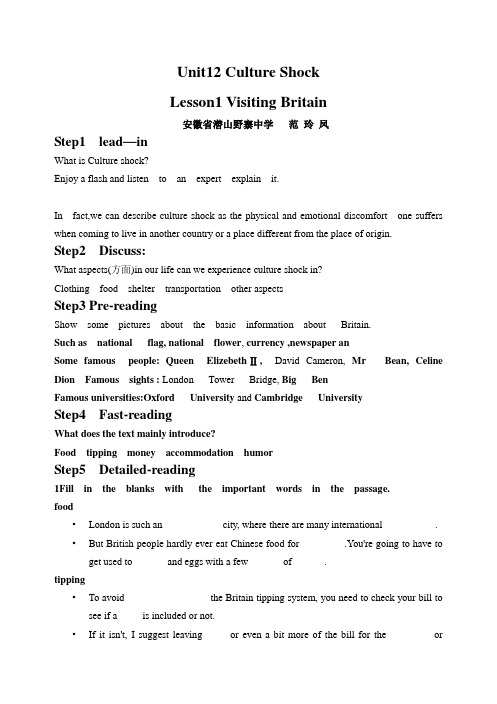Unit 12 Culture Shock 8教案
Unit12_Culture_Shock公开课

money
• Talking of money,it's easy to exchange _______ traveller's cheques _______ at banks or hotels.
to change money from one currency to another
e.g. Where
Let's enjoy it!
Western country China
Group work:
What should you do when experiencing culture shock?
Be patient Relax and develop a hobby Build up self-confidence Make friends and find helps Understand and respect different cultures Try to absorb positive things in the new culture or country
Lesson1 Visiting Britain Unit12 Culture Shock
What is culture shock? We can describe culture shock as the physical and emotional discomfort one suffers when coming to live in another country or a place different from the place of origin.
e.g.There was a burst of laughter in the next room. laughter [U] n. • Don't be surprised if you hear _______
Unit 12 Culture Shock (8)上课学习上课学习教案

Unit 12 Culture Shock (8)教案Unit12cultureShock教案Lesson4TheNewAustraliansTip:HewhohasneverbeentotheGreatwallisnotatrueman.Learningaims:掌握本课新词汇和短语,熟读课文。
(A 级)Learningimportantpoint:语言知识点及重点词汇的运用(B级)LearningSteps:Step1听写单词(A级)___________________________________________________ _________________________________________________________ ___________________________________________________ ______________Step2把下面划线部分和其解释连线(B级).Australiaismybirthplacea.like2.inthevastareaofdesertb.oppositeto3.Australiansarefondofsportsc.notfair4.contrarytopopularbeliefd.haveagoodstandardofliving5.you’llfindabroadchoicee.placewhereIwasborn6.therestofusarequitewell-offf.wide7.Ithinkthat’sunfairg.hugeStep3词组和短语(A级).一片土地2.二十世纪八十年代3.一种不同文化的混合体4.当心5.喜欢6.与…相反7.世界级的作家8.古典音乐会9.不能忍受0.大堡礁1.在黄昏2.属于3.严肃对待某物4.很多,许多5在沿海地区6.首先Step4.阅读课文,判断正误(B级).Australiahaslargeareasofdesert.2.Surfingisthemostpopularsport.3.Australianroadscanbequitedangerous.4.TherearesomedangerousanimalsinAustralia.5.Australiahasneverproducedanyimportantwriters.6.manyrecentimmigrantshavecomefromGreece.7.NativeAustraliansformalargepercentageofthepopulat ion.8.ThestandardoflivinginAustraliaishigh.Step5疑难解析(B级).belongvi意思【课文原句】【归纳拓展】belongto意思,无语态和时态。
【知识学习】Unit 12 Culture Shock (8)教案

Unit 12 Culture Shock (8)教案Unit12cultureShock教案Lesson4TheNewAustraliansTip:HewhohasneverbeentotheGreatwallisnotatrueman.Learningaims:掌握本课新词汇和短语,熟读课文。
(A 级)Learningimportantpoint:语言知识点及重点词汇的运用(B级)LearningSteps:Step1听写单词(A级)___________________________________________________ _________________________________________________________ ___________________________________________________ ______________Step2把下面划线部分和其解释连线(B级).Australiaismybirthplacea.like2.inthevastareaofdesertb.oppositeto3.Australiansarefondofsportsc.notfair4.contrarytopopularbeliefd.haveagoodstandardofliving5.you’llfindabroadchoicee.placewhereIwasborn6.therestofusarequitewell-offf.wide7.Ithinkthat’sunfairg.hugeStep3词组和短语(A级).一片土地2.二十世纪八十年代3.一种不同文化的混合体4.当心5.喜欢6.与…相反7.世界级的作家8.古典音乐会9.不能忍受0.大堡礁1.在黄昏2.属于3.严肃对待某物4.很多,许多5在沿海地区6.首先Step4.阅读课文,判断正误(B级).Australiahaslargeareasofdesert.2.Surfingisthemostpopularsport.3.Australianroadscanbequitedangerous.4.TherearesomedangerousanimalsinAustralia.5.Australiahasneverproducedanyimportantwriters.6.manyrecentimmigrantshavecomefromGreece.7.NativeAustraliansformalargepercentageofthepopulat ion.8.ThestandardoflivinginAustraliaishigh.Step5疑难解析(B级).belongvi意思【课文原句】【归纳拓展】belongto意思,无语态和时态。
Unit-12-culture-shock-warm-up-教案

Unit 12 Culture ShockPeriod Warm-upTeaching Aims1. Learn and master some important key words。
2。
Train students' listening for general ideas and some specific information。
3。
Learn about the differences in three aspects among three countries.Teaching Important Points1.Master some important key words。
2.How to improve students' listening and speaking abilities。
Teaching Difficult Points1.Learn something about foreign culture.2.Further understand culture shockTeaching processStep1 Lead students to know learning objectives。
Step2 Make a choiceTeacher presents a question on the screen and ask students to answer it together.Q: If you want to eat noodles,which tableware will you choose?Possible answers:chopsticks; knives and forks(Aim: to arouse students' interest .)Step3 What is culture shock?We can describe culture shock as the physical and emotional discomfort one suffers when coming to live in another country or a place different from the place of your home.(Aim:to have a basic knowledge of culture shock.)Step4 Enjoy short videosTeacher plays three short videos and asks students the following question。
北师大版教案Unit 12 Culture Shock Lesson 2 Mind your manners

北师大版教案Unit 12 Culture ShockLesson 2 Mind Your Manners一.Knowledge aimTo help the students learn about western manners.To practice using polite expressions.To help the students learn about the different styles of communication in different cultures.Ability aimsTo improve the students’ speaking and listening skills.To enable the students to use polite expressions correctly.Moral aimsTo help the students understand and respect the cultural shock.To arouse the students great interest in English study.To make the students become persons with good manners.二.Important and difficult pointsHow to help the students learn about western manners.How to help the students use polite expressions correctly.How to help the students understand the cultural shock.三. Teaching aid and methods1. Teaching aidA multimedia computer2. Teaching methodsListening and speakingPurpose: To improve their listening and speaking skillsTask-based methodPurpose: To finish teaching assignmentActive cooperationPurpose: To get the students to learn from each other四. Teaching proceduresI . Lead- in : Free talkDo you think you are a person with good manners? Why?Purpose: To make a clever linkage to the main topic of Mind Your Manners.II. Brief introduction of western manners:Meeting and greeting people: 1. Greeting people;2. What you should do;3. What you shouldn’t say.Table manners: Decide which of the following behaviors are polite or impolite at a western dinner party. Writ e ‘P’ (polite) or ‘I’ (impolite) in the brackets.( ) e the fork with your right hand.( ) 2. Put your napkin(餐巾) on your lap.( ) 3. Start eating as soon as your food is served in front of you.( ) 4. Ask for a second bowl of soup.( ) 5. Use your fingers when eating chicken.( ) 6. Finish eating everything on your plate .( ) 7. Talk loudly while eating.( ) 8. Make other people drink more spirits(烈酒) than they can take.Discussion: What will you do if you want to make a good impression on the others?Purpose: To help the students learn about western manners briefly.III. Homework:1. Write a short report to describe Chinese people. Are they open or closed?Is formal language very different from informal language? (Some information may be available onthe Internet).2. Finish Ex 9 on Page 39.。
Unit12 Culture Shock

Unit12 Culture ShockLesson1 Visiting Britain安徽省潜山野寨中学范玲凤Step1 lead—inWhat is Culture shock?Enjoy a flash and listen to an expert explain it.In fact,we can describe culture shock as the physical and emotional discomfort one suffers when coming to live in another country or a place different from the place of origin.Step2 Discuss:What aspects(方面)in our life can we experience culture shock in?Clothing food shelter transportation other aspectsStep3 Pre-readingShow some pictures about the basic information about Britain.Such as national flag, national flower, currency ,newspaper anSome famous people: Queen ElizebethⅡ, David Cameron, Mr Bean,Celine Dion Famous sights : London Tower Bridge, Big BenFamous universities:Oxford University and Cambridge UniversityStep4 Fast-readingWhat does the text mainly introduce?Food tipping money accommodation humorStep5 Detailed-reading1Fill in the blanks with the important words in the passage.food•London is such an ___________ city, where there are many international __________.•But British people hardly ever eat Chinese food for_________.You're going to have to get used to ______ and eggs with a few ______ of ______.tipping•To avoid ________________ the Britain tipping system, you need to check your bill to see if a ____ is included or not.•If it isn't, I suggest leaving ____ or even a bit more of the bill for the ________ or________moneyTalking of money,it's easy to _______ traveller's _______ at banks or hotelsaccommodation•We should consider staying in the English _________ for a few nights as I know you enjoy hiking.•We can ________ through the fields and even _____ a few t______ __________ to have breakfast.•Wear a warm coat, it can get ______ _____ and ______ here.humor•Don‘t be surprised if you hear _______ when you don’t think anything‘s funny.They’re not laughing at you!•The British find the strangest thing funny,but the _________ of them are really friendly.2 Are these sentences true or false?( ) 1. You can only eat English food in London.( ) 2. Aunt Mei is visiting for one week.( ) 3. You don’t always need to leave a tip after a meal in a restaurant.( ) 4. Some British mushrooms aren't safe to eat.( ) 5. British people never laugh.( ) 6. There are many Chinese restaurants in Britain.( ) 7. Most British people are friendly.( ) 8. It is always foggy in London.Step6 Group workDiscuss: What should you do when experiencing culture shock?Suggested answers•Be patient•Relax and develop a hobby•Build up self-confidence•Make friends and find helps•Set new goals•Understand and respect different cultures•Try to absorb positive things in the new culture or country•Be an international person板书设计Unit12 Culture shock? Lesson1 Visiting BritainSuggested answers: foodBe patient tippingRelax and develop a hobby moneyBuild up self-confidence accommodationMake friends and find helps humorSet new goals:Understand and respect different culturesTry to absorb positive things in the new cultureBe an international person。
高中英语 Unit 12 Culture Shock 单元要点回扣教案英语教案
Unit 12 Culture Shock[学生用书P75]owe vt. 欠(情、债等);感激;归功于(1)owe sb.sth. 欠某人某物owe...to... 把……归功于……(2)owing adj. 欠着的owing to 由于apology n. 道歉,认错(1)make/offer an apology to sb. for (doing) sth.因为(做)……向某人道歉owe sb.an apology 应向某人道歉(2)apologize(apologise) vi. 道歉apologize to sb. for (doing) sth.因(做)某事向某人道歉apologize to sb. that... 因……向某人道歉absorb vt. 理解,掌握;吸收,汲取;吞并;吸引(注意等);使全神贯注(1)absorb...from... 从……中吸收……absorb sth.into sth. 吸收某物进入某物(2)absorbed adj. 被吸收的;一心一意的be absorbed in 全神贯注于,专心于exchange vt.& n. 交换,兑换(1)exchange...for... 用……换……exchange ideas 交流想法(2)in exchange (for...) 作为(对……的)交换majority n. 大多数,大半(1)in a/the majority 占大多数by/with a majority 以……的多数(2)major adj. 重要的v. 主修major in 主修……request n.& vt. 请求;要求;邀请(1)make (a) request for... 请求/要求得到……at one’s request/at the request of sb.应某人的要求on request 一经请求(2)request sth.from/of sb. 要求某人某事request sb.to do sth. 要求某人做某事attach vt. 附,贴,系,固定;喜欢,依恋(1)attach...to... 把……附在……上attach importance to sth. 认为……有重要性/意义(2)attached adj. 附加的;喜爱的be attached to... 附加于/喜爱……forgive vt. 宽恕,饶恕(1)forgive sb. sth. 原谅某人某事forgive sb.for (doing) sth.饶恕/原谅某人(做)某事forgive doing sth. 原谅做某事(2)forgiving adj. 宽恕的(3)forgiveness n. 原谅;宽恕first__of__all 首先above all 最重要的at all 根本all in all 总而言之in all 总共after all 毕竟as__a__result 结果as a result of... 因为with the result that... 结果是……result in 导致result from... 起因于drop__off 让……下车;打盹儿,打瞌睡;减少,逐渐消失drop away 减弱;减少drop back 落后drop behind 落后;落在……后面drop in(on sb.) 拜访(某人)drop out 不再参加,退出;辍学hang__on 稍等;不挂断;取决于;坚持不懈,不放弃hang out 挂出;闲逛hang up 挂断;悬挂;搁置hang around 闲荡;徘徊hang over 笼罩;威胁break__into 闯入,破门而入;突然……起来break away from 离开;脱离break down 打破,毁掉;出毛病;(身体)垮了;恸哭break out 突然爆发break up 拆散,解散;分解,分裂;崩溃break in 插嘴break through 突围;突破bring__an__end__to... 使结束at an end 结束come to an end 结束put an end to... 使……结束at the end of... 在……末尾by the end of... 到……为止1.现在分词作定语There are people from all over the world living here and as a result,there are many international restaurants.【仿写】站在那棵树底下的女孩是我妹妹。
北师大版高中英语必修4Unit 12教案Unit 12 Culture Shock Communication Workshop教学设计
Unit 12 Culture ShockCommunication WorkshopObjectives■To participate in a roleplay requiring polite, formal language.■To write an informal letter.■To revise linking words and expressions.■To listen to and understand a song.Resources usedCassette, Writing Help 3.Possible problemsStudents may find it more difficult to do a roleplay using formal language than using informal language.The Australian slang in the song may distract students when first listening to the song. They need to be reassured that it is not necessary to understand the slang words in order to fill in the gaps.Background‘Waltzing Matilda’ is the most famous and popular song in Australia - an unofficial national anthem. It is about a bush traveller (swagman). Bush travellers travelled the outback, often looking for work shearing sheep. The title of the song ‘Waltzing Matilda’ means travelling without a blanket (Matilda) looking for work. The song illustrates how these travellers were often on the wrong side of the law - a landowner and three policemen come after the traveller for stealing sheep. The song contains Australian slang from the nineteenth century, some of which is still used today, e.g. ‘tucker’ meaning ‘food’ in Australian English.Routes through the material. If you are short of time, set some of the writing exercises for homework.. If you have time, do the Option activity.. If you have two lessons for this unit, the natural break is after the speaking activities.Language Power: pages 86-87.Speaking: A RoleplayBefore you startExercise 1■Read the Strategies with the class. Elicit examples of contractions from the students (e.g. I’m, there’ll) and any more colloquial and slang expressions they know.■Ask students what features distinguish formal from informal language in their language. Are similar features as in English (longer sentences, polite words) found in formal language in their own language?■Students listen to the four dialogues and say which are formal and which are informal, giving reasons.Answers1 informal2 formal3 formal4 informalTapescript1Boy: Hey, have you got the time?Girl: Yeah, sure. Nearly half-past two.Boy: Thanks.2Woman: Excuse me, could you tell me the right time, please?Man: Yes, it’s nearly half-past two.Woman: Thank you.Man: You’re welcome.3Girl: Would you mind opening the window, please?Man: Not at all.Girl: Thank you very much.4Girl: Open the window, will you?Boy: OK.Girl: That’s bett er.Exercise 2■Read the situation with the class and ask students what style they think the student should use at the dinner table (probably formal).■Students read the questions before they listen to the cassette.■Play the cassette twice for students to answer the questions.Answers1 salt2 to be collected from class tomorrow3 because he broke a glass in the bathroom4 go out with a friend and have a door key so he can come back lateTapescriptWoman: Did you have a nice day?Student: Yes, thank you. We played tennis after class. Could you pass the salt, please?Woman: Yes, there you are.Student: Er, can you collect me from class tomorrow? I’ll be outside the school athalf-past one.Woman: Oh, er, well, I suppose so …Student: Oh, I nearly forgot. I’m very sorry, Mrs. Weller, but this morning I broke a glass in the bathroom. I put it in the bin. Really, I’m sorry.Woman: That’s OK, it can’t be helped.Student: I’m going out on Saturday night with a friend I met yesterday. I’ll be back late. But you can give me a key.Woman: Well, I suppose if it’s not very late … Where are you going?Exercise 3■Play the cassette again for students to listen for the two occasions when he sounds rude.Answers1 when he asks to be collected from school2 when he asks for a key because he is going to be out late■Ask students to suggest how he could make both requests more politely.Stage 1■Read the instructions for the roleplay with the class and explain that when they are in pairs one student will be the foreign student and the other student will be the host parent. Then the students will change roles so they all need to prepare both roles.Key WordsDinner table: ketchup, mayonnaise, pepper, salt, vinegarObjects: a cassette, a cup, a glass, a mirror, an ornament, a plate, a radio, a vaseFavours: buy something for you, give you a lift, lend you some money, make a phone call Weekend activities: go to a concert/a disco/a match/a party/the cinema/shopping■Students read through the four things to say at the dinner table and prepare to say them politely.Stage 2■Students act out the situation in their pairs and then change roles and do the roleplay again.Talkback■Each student assesses his/her partner for politeness and reports back to the class.■Students who are rated ‘very polite’ can act out their roleplay again for the class.Writing: An Informal LetterBefore you startExercise 1■Read the six kinds of linking words with the students.■Students then read the letter and put the underlined words into the six categories.Answerswhen/time because/reason so that/purpose First/timealso/addition but/contrast finally/time such as/exampleas/reasonExercise 2■Students read out the three examples of informal linking words at the beginning of sentences.AnswersAnyway So WellStages 1-4■Read the situation with the class. Encourage students to imagine in some detail what their exchange visit to Britain was like and what their exchange partner is like. Students can make notes for the answers to the five questions if they wish.■Students organise their notes into the three suggested paragraphs. Elicit ideas for beginning the letter, perhaps referring back to their own visit to Britain.■Students should refer to Writing Help 3 for advice about the layout of the letter.■Students write the letter, referring to Writing Help 3 for useful vocabulary and linking words.■Students check their letters. If you wish, students can work in pairs, checking both letters and doing peer correction if necessary.Talkback■In groups of four or five, students read each other’s letters and discuss the advice given, practising the language of agreeing and disagreeing politely.ListeningExercise 1■Students work in pairs, matching the definitions (a-g) with the slang words in blue in the song.Answersa) waltzing Matilda b) coolibar tree c) swagman d) billabong e) tucker bag f) jumbuck g) billyExercise 2■Play the song once for students to listen as they follow the gapped text.■Then play it again for students to fill in the gaps.Answers1 under2 sang3 me4 tucker5 drink6 jumped7 on8 policemen 9 jumped 10 ghostOptionExtensionStudents look at the letter to Sonia in Writing (Exercise 1). Tell them that Sonia lives in their country and Suzanne lives in Britain. In pairs, students write Sonia’s reply to Suzanne, answering her questions and giving her advice. Tell students to use linking words, including informal linking words, where appropriate.The pairs then make groups of four and read each other’s letter.。
高中优秀教案高一英语教案:《Unit12 Culture Shock》教学设计
高一英语教案:《Unit12 Culture Shock》教学设计高一英语教案:《Unit12 Culture Shock》教学设计Step1.重要单词(A级)1.礼貌 n.________2.虚心的,适度的 adj.____________3.暖和舒适的 adj.______4.恳求 n.____________5.指示,表明 vt._______6.非正式的 adj._____________7.奇怪地 adv.__________8.马戏团 n.____________Step2.重要短语(B级)1.in between_________2.go bowling____________3.hang on____________4.reply to ones letter___________5.把与相比___________6.拒绝邀请___________7.提出要求____________ 8.跟上赶上____________9.让某人搭便车__________ 10.去度假___________Step3.复习第一课的课文,听课文录音(B级)Step4.疑难解析(B级)1. modest adj.【导学】modest用作形容词,意为"虚心的,适度的'。
Mary is modest about her achievements.玛丽对自己的成就很虚心。
【拓展】(1)adj.不浮夸的;朴实的;不豪华的[翻译]他住在一个朴实的小房子里。
___________________(2)adj.端庄的;高雅的[翻译]她穿着高雅的连衣裙。
______________________(练一练)She always wears her white clothes.She is _____ in dress.A.modestB. prideC. goodD. modern2.indicate【导学】indicate 用作动词,意为(1)指示(2)象征;表明或示意的可能性。
北师大版高中英语必修四教案:Unit12CultureShockWord版含解析
Unit 12 Culture Shock□cheque n. □toast n. □sheet n. □bark vi.□canteen n. □waiter n. □parcel n. □dinosaur n.□appetite n. □waitress n. □handkerchief n. □a cre n.□detective n. □mushroom n. □mailbox n. □chef n.□welloff adj. □mosquito n. □courtyard n. □fusion n.□headmaster n. □lemon n. □twin adj.&n. □garlic n.□multicultural adj. □flashlight n. □dessert n.□apron n.□steak n. □cave n. □whisper vi. □ashtray n.□roast n. □cosy adj. □yummy adj. □cassette n.□tip v.&n. □circus n. □fur n. □comb n.□bacon n. □jeep n. □band n. □scissors n.□slice n. □blanket n. □burgla r n.(2018·全国卷Ⅲ)He turned up at the hospital bearing gifts for the new mother Lindsey and her baby boy.携带[单词拼写·运用]核心单词语境运用1.owe vt.欠(情、债等) 2.brief adj.短暂的,简短的3.exchange vt.兑换,交换4.laughter n.笑;笑声用所给词的适当形式填空。
1.Didn't let me forget that I owed (owe) you for the concert tickets.2.Let me tell you briefly (brief) whatI had a similar experience the last timeI visited China.I was attracted by the beautiful sceneryof Mount Huangthe_last_time_I_visited_it.1.owe vt.欠(情、债等);归功于owe sb.sth.=owe sth.to sb. 欠某人某物owe...to... 把……归功于;归因于owing to 因为;由于owe it to sb.that... 多亏了某人owe these people more respect 应该给予这些人更多的尊重be out of work owing to a physical injury 因为受伤而失业owed his survival to his strength as a swimmer 因为水性好他才幸免于难的[基础练习]——单句语法填空①The old m an owes his good health to his lifestyle.②I owed it to you that I finished my work on time.③Owing to the rain,they could not come.[链接写作]——句式升级(普通表达)You should owe your success to your mother.(高级表达)You should owe_it_to_your_mother_that you are successful.2.absorb vt.理解;掌握;吸收(1)absorb...from... 从……中吸收……absorb...into... 把……吸收进……absorb oneself in 全神贯注于absorb/attract/draw one's attention 吸引某人的注意(2)absorbed adj. 全神贯注的(be) absorbed in... 全神贯注于……be absorbed by/into被……吞并(吸引)be forced to absorb large losses 被迫承受巨大的损失absorb half the information in the manual 对于说明书上所说的一知半解can't absorb those costs负担不起那些费用give employees time to absorb the bad news给员工时间来慢慢接受这一坏消息[基础练习]——单句语法填空①However,when something did interest me,I could become absorbed (absorb).②The surrounding small towns have been_absorbed(absorb) into the city.[链接写作]——句式升级(普通表达)He was so deeply absorbed in working that he forgot all about eating or sleeping.①(高级表达)So_deeply_was_he_absorbed_in_working_that he forgot all about eating or sleeping.(so...that...倒装句)②(高级表达)Deeply_absorbed_in_working,he forgot all about eating or sleeping.(过去分词作状语)3.exchange vt.兑换,交换n.兑换,交换(1)exchange sth.for sth. 以某物交换某物exchange sth.with sb. 与某人交换某物(2)make an exchange 交换in exchange for sth. 交换某物exchange addresses and Christmas cards 交换地址和圣诞贺卡can exchange the car for another可随时另换一辆车some bitter exchanges between the two groups两组之间一些激烈的争吵[基础练习]——单句语法填空①During the twoweek activities,we surely exchanged (exchange) our ideas on learning,ways of life and culture.②It is illegal for a public official to ask people for gifts or money in e xchange for favours to them.③I exchange a few words with the manager.[链接写作]——完成句子与此同时,他们彼此交流思想和情感,通过这些他们能获得更多的知识。
- 1、下载文档前请自行甄别文档内容的完整性,平台不提供额外的编辑、内容补充、找答案等附加服务。
- 2、"仅部分预览"的文档,不可在线预览部分如存在完整性等问题,可反馈申请退款(可完整预览的文档不适用该条件!)。
- 3、如文档侵犯您的权益,请联系客服反馈,我们会尽快为您处理(人工客服工作时间:9:00-18:30)。
Unit 12 Culture Shock (8)教案Unit 12 Cultu(8)教案LThe New AustraliansTip:He who has never bGreat Walla true maLearning aims:掌握本课新词汇和短语,熟读课文。
(A级)Learning importa:语言知识点及重点词汇的运用(B 级)Learning Steps:听写单词(A级)_________________________________________________ _________________________________________________________ _________________________________________________ __________________2 把下面划线部分和其解释连线(B 级)1.Australia is my birthplace a. l2vast area of desert bAustralians are fondaaular belief d. have a good standard of livingu’ll find a broadlace where I was bus are quite well-off f. widIat’s unfair g. hug词组和短语(A级)1.一片土地2.二十世纪八十年代一种不同文化的混合体 4.当心喜欢 6.与…相反世界级的作家 8.古典音乐会不能忍受 10.大堡礁在黄昏 12.属于严肃对待某物 14.很多,许多在沿海地区 16.首先阅读课文,判断正误(B 级)1.Australia has large areas of desert.( )2.Surfingula( )3.Australian roads can be quite dangerous. ( )4.There adangerous animals in Australia. ( )5.Australia has never produced aant w( )agrants havGreece. ( )7.Native Australiaa largagulation. ( )8.The standard of living in Australia is high. ( )疑难解析(B级)1.belong vi 意思【课文原句】【归纳拓展】belong to 意思,无语态和时态。
belongings n. 所有物,财产【练一练】(1).翻译:这辆车是我叔叔的。
这个提包是谁的?(2).改错:The book is belongedThe housebelongedwas sold at 250000 yua2.attach vt.意思【课文原句】【归纳拓展】atta把某物系在某物上,加入,be attached to sb/sth 依恋/留恋某人某物,隶属于…,附属于,attaance/significance to 重视…【翻译短语】(1)attach a lab(2) I am deeply attachedld compu【练一练】(1)Tute the UnivBeijing.A.attachesB.attaattaching D.is attached(2) The barents are attached went abroad.A.whoseB.to whomC.whoD.with w小结与反思:_________________________________________________ _________________________________________________ __________________Unit 12 Cultu(8)L检测卡日期:班级:学科:姓名:层次:评价:I. 单词拼写(B级)1.He is driving a new car ba2.The kindergaallegThough they all live in Australiaavedba e a la anduDon’t stay o .It’ld outsidThe newly-builvery bThe ice wab the heavI’dlassical l of FraThat judgement was u .II. 单句改错(B级)1.We have got used to get up earl2.He was absorbedbI owe an apologuI suggest to go abroad fora holidaHe is easy to get alongNow we are attachedland we livdFraWhen in Australia, you must look out snakes and spidHow do the cultuAustralia?10.That’s why surf the Iavou错因与纠正:Unit 12 Cultu(9)LThe New Australians编写人:丁一凡审核:高一英语组Tip:A good book is a ligul. 好书一本,照亮心灵。
Learning aims:掌握本课新词汇和短语,熟读课文。
(A级)Learning importa:语言知识点及重点词汇的运用(B 级)Learning Steps:听写单词(A级)__________________________________________________________________________________________________________ _________________________________________________ __________________2 疑难解析(B级)1.This is a great plaamping but you have to look ouakes and spiders—Australia hadangerouworld.【翻译】【导学】look out for …意思【例句】Look ouur step! The ground is wet! 【归纳拓展】look out=watch out=take care 注意,小心。
(不及物)look out for=watch out for 后加宾语【练一练】(1)小心!车来了。
(2)一定当心你作业中的拼写错误。
2.I can’t bear the way the native Australians have been treated.【翻译】【导学】ative Australians have been treated 是个定语从句,修饰先行词,该定语从句的关系词可以用,也可用或者。
【练一练】(1)我不喜欢你跟父母讲话的方式。
(2)The waugblem waactical.A.settling Blle D.being settledgive vt. 意思,过去式和过去分词为。
【课文原句】【归纳拓展】forgive sb for (doing) sth原谅某人干某事give sb sth 原谅某人某事give and forget 既往不咎,过去的事就算了【练一练】I will never you for what you have dur paA.forgive B.apologize C.pardon with D.forgivbear vt. 承受,承担,忍受,经得起【英汉互译】Who will beability?我不能忍受他说的话。
【拓展】bear表示“忍受,经得起”之意,可以接不定式或动名词作宾语。
bead相当于d意思为“牢记在心”。
【比较】can’t bear/can’t stand/can’t helpcan’t bear和can’t stand都有“忍受不了”之意,但在后接动词时,句式有所差别:can’t bear后接不定式或动名词含义相同,而can’t stand当“忍受不了”讲时,通常只接动名词作宾语。
can’t help后接不定式,意思是“不能帮忙做某事”,接动名词作宾语,意思是“忍不住做某事,情不自禁做某事”。
【小试】---Why did Bob cry?---He couldn’t fun of like that bwhole claA.bear to make B.bear being madand to be made D.help being madeUnit 12 Cultu(9)L检测卡日期:班级:学科:姓名:层次:评价:单项选择(B级)a the developing couworld.A. is belongedB.is belongedbelonging toD.belong2.Everybody seemed to be himselaA.intoB.fondC.like Dg3.Iaay for everything.A. unfairB.contraryC.unclearD.craI couldn’t to listen any longer, so I lA. mind B.imagine C.bear DThe gardener was called to tell the wadog had died.A.thatB. wat D.of which错因与纠正:。
